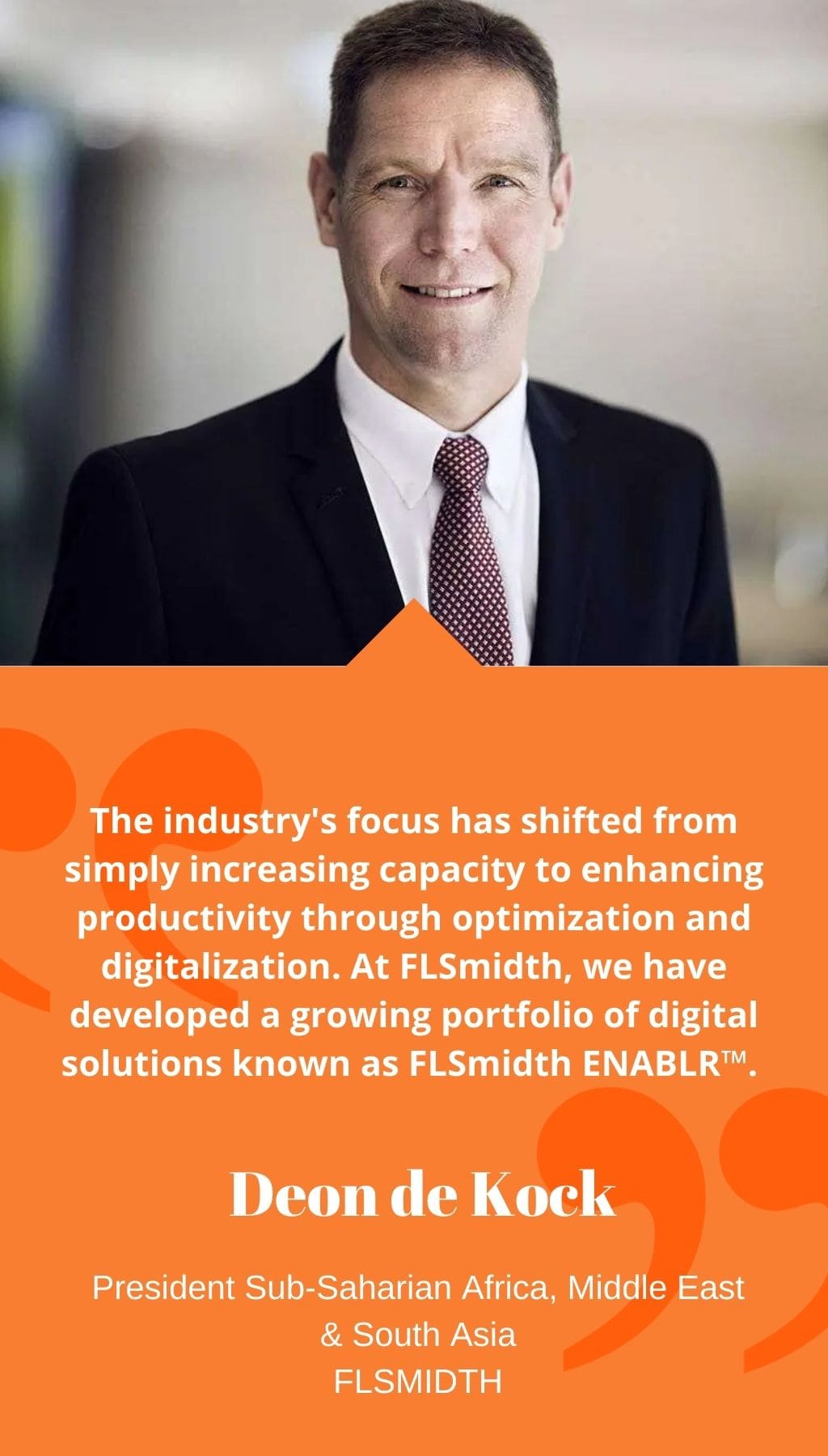
- South Africa | 11 November 2021

Can you elaborate on FLSmidth’s MissionZero plan?
MissionZero is our ambitious sustainability plan aimed at helping cement and mining customers transition to zero emissions, 100% fuel substitution, and zero water and energy waste by 2030. The plan recognizes the crucial role of these industries in addressing climate change challenges. For example, the extraction of battery minerals like lithium is vital for the green-energy transition. FLSmidth’s involvement in lithium extraction for 25 years has positioned us to play a significant role in making battery mineral extraction more sustainable, thus contributing to a low-carbon future. Our recent contract for product engineering in a lithium-boron project in Nevada and the delivery of advanced lithium-centred technologies to Covalent in Australia further exemplify our commitment to sustainable mining practices.
Can you elaborate on FLSmidth’s dewatering technology offering under the company’s MissionZero program?
One of our key offerings in the dewatering technology space is dry stack tailings technology. This method provides a sustainable approach to store filtered tailings, enabling better recovery of dissolved metals and process chemicals. The Dry Stack Tailings process allows for the recirculation of up to 95% of mine process water, eliminating the need for wet tailings dams and mitigating the risks associated with dam failures. This technology has significant environmental benefits, including reduced fresh water use, minimized acid rock drainage, a smaller mine footprint, and overall risk reduction. We also collaborated with Goldcorp to develop the EcoTails™ filter technology, which blends filtered tailings with waste rock, creating a stable waste product that eliminates the need for conventional slurry tailings containment in a dam.
In addition, FLSmidth offers dry processing technologies to address water scarcity challenges. Our filter presses facilitate water recirculation, allowing for the reclamation of up to 90% of water for reuse in the plant. Given that approximately 70% of global mines are located in water-stressed regions, sustainable and smarter water and tailings management is essential. We recently received an order from Hindustan Zinc Limited (HZL) to deliver an integrated dry stack tailings solution and a paste fill plant to their lead-zinc mine in Rajasthan, India, highlighting the growing industry interest in these solutions.
Can you also elaborate on FLSmidth’s automated and digital technologies?
The industry’s focus has shifted from simply increasing capacity to enhancing productivity through optimization and digitalization. At FLSmidth, we have developed a growing portfolio of digital solutions known as FLSmidth ENABLR™. These solutions leverage the power of data and combine it with human expertise to drive improvements in reliability, productivity, and sustainability. Our flagship process control platform, ECS/ControlCenter™, serves as the interface between equipment and cloud data storage, enabling real-time monitoring and control. Additionally, our SiteConnect™ mobile app allows for on-the-go monitoring of equipment and process performance.
At both the plant and process level, we offer advanced solutions such as ECS/ProcessExpert®, which not only facilitates monitoring and control but also enables advanced optimization through the application of AI technologies. By harnessing these automated and digital technologies, our customers can achieve significant gains in operational efficiency, reduce energy consumption, and enhance sustainability.
How is FLSmidth navigating the local content and BEE laws in South Africa?
FLSmidth fully subscribes to broad-based black economic empowerment (BB-BEE) principles, ensuring compliance with local content and BEE laws in South Africa. We support various aspects of BB-BEE initiatives, including the development of local suppliers and small enterprises, as well as fostering a strong talent pipeline. Currently, we have around 50 apprentices in training, and we annually award five scholarships to students from previously disadvantaged communities pursuing chemical, mechanical, and metallurgical engineering degrees. Our aim is to promote young talent into management positions, alongside traditional talent sources, as we recognize the value they bring to the mining and cement industries.
However, achieving the 60% local content compliance requirement poses challenges for multinationals like us. We are actively working with the government to identify opportunities and solutions that align with these regulations. It’s worth noting that the frequent changes in BBE regulations and political unpredictability are factors that impact foreign direct investment in South Africa, adding to the complexity of navigating local content requirements.














